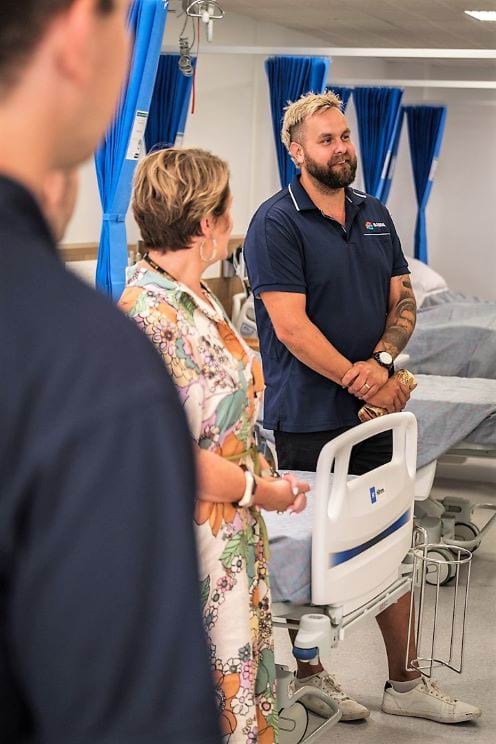Opportunities for Victorian Aboriginal people
Aboriginal Peoples have enjoyed thriving economies for thousands of years, based on connections to land, water and resources. Colonisation, along with its associated dispossession and intergenerational trauma, disrupted these economic systems and continues to play out in experiences of Victoria’s Aboriginal communities.
The Framework, alongside Yuma Yirramboi (Invest in Tomorrow), Victoria’s Aboriginal employment and economic development strategy, aims to level the playing field and drive economic prosperity for Aboriginal Victorians.
By supporting Victorian Aboriginal businesses to participate in government procurement processes, the Victorian Government is creating more opportunities for Aboriginal people to participate in economic opportunities that others take for granted as well as supporting them to achieve self-determination.
This supports the Victorian Government to work alongside Aboriginal businesses, peak bodies, Traditional Owners and community more broadly to build a pathway toward Treaty with the First People’s Assembly of Victoria.
As we continue to work towards self-determination, the growth and success of the First Nations business sector in Victoria is crucial. By supporting First Nations entrepreneurship and economic development, we are creating opportunities for self-determination and building stronger, more resilient communities. Kinaway Chamber of Commerce, in partnership with the Victorian Government continue to work together to promote economic and social inclusion and support the growth of First Nations businesses. By working together, we are helping to build stronger and more sustainable communities for all.
Key Achivements
From 1 July 2021 to 30 June 2022, the Victorian Government directly spent:
- $11.8 million with 81 certified Victorian Aboriginal businesses
- $9.8 million with 48 other Aboriginal organisations
- $1.5 million with Muru Group, a certified Victorian Aboriginal business through the Stationery and Workplace Consumables state purchase contract
- $0.2 million with certified Victorian Aboriginal businesses through the Print Management and Associated Services state purchase contract
Between 2020-21 and 2021–22, there were fluctuations in expenditure and engagement with the Victorian Aboriginal business sector:
- 23% increase in total expenditure with other Aboriginal organisations
- 11% decrease in total expenditure with certified Victorian Aboriginal businesses
- 55% increase in the total number of other Aboriginal organisations
- 17% decrease in the total number of certified Victorian Aboriginal businesses
There was a spike in expenditure with certified Victorian Aboriginal businesses during financial years 2020–21 and 2021–22, primarily due to the COVID-19 pandemic. Subsequent reductions in expenditure are associated with a significant decrease in spend on personal protective equipment for whole-of- Victorian-Government including frontline workers and community groups experiencing vulnerability. Current spend is still above the inaugural reporting year of 2018–19.
There is increased expenditure with other Aboriginal organisations primarily because they delivered critical services to Aboriginal Victorians living in regions experiencing entrenched disadvantage.
Compared to the inaugural reporting year (2018–19), the Victorian Government has engaged with 37% more certified Victorian Aboriginal businesses and other Aboriginal organisations. This represents a 30% increase in expenditure with those businesses and organisations.
Case Study: Bendigo Kangan Institute and Barpa
Working in partnership with Victorian Aboriginal communities and providing economic opportunities is key to boosting self-determination. This is one of the core concepts that underpins the Bendigo Kangan Institute’s engagement of Aboriginal construction company, Barpa. Barpa was engaged to undertake 5 construction projects across Bendigo Kangan Institute’s campuses.
Barpa is a Kinaway-certified, majority Aboriginal-owned business, formed in 2014. They provide training and employment opportunities for Aboriginal people, support the Aboriginal business sector and pay dividends to their community of Aboriginal owners. Barpa has experience constructing commercial buildings, manufacturing facilities, retail outlets, educational facilities, hospitals and sports and recreation facilities. Committed to making a positive difference for Aboriginal people, Barpa embeds several core principles across its entire business, including empowering Aboriginal people and businesses.
Building Australian infrastructure allows Barpa to achieve this mission. Bendigo Kangan Institute engaged Barpa for 5 projects totalling approximately $2 million during 2021–22.
Two of these projects provided employment opportunities for 8 Victorians, 3 of whom are Aboriginal.
The first project Barpa undertook in Victoria was the refurbishment of a general-purpose classroom into a retail veterinary clinic at the Broadmeadows Campus that also served as a Vocational Education and Training space to ensure compliance with the Veterinary Training Practice Standards of the Australian Veterinary Association. This project provided an opportunity for one Aboriginal employee from Barpa’s Djarmbi Mentoring Program to work on the refurbishment.
After the successful completion of the Broadmeadows veterinary clinic project, Bendigo Kangan Institute engaged Barpa to undertake further works at their Essendon Campus to create a ‘Health Hub’ for nursing and allied health students. This learning space included 2 nursing simulators, a pathology simulator, a nursing store, a pathology store, a shared bathroom and shared ‘clean and dirty rooms’.10
Both projects provided crucial construction experience and career development opportunities for the 3 Aboriginal employees involved over the duration of the works and all employees engaged on the projects have ongoing work with Barpa. Along with the construction experience for Aboriginal employees, Barpa made conscious efforts to include other Aboriginal businesses within their supply chain while completing these projects with Bendigo Kangan Institute. These businesses included Djurwa Waste Management; marketing and creative agency, Little Rocket; commercial painting company, Kianga Group; and office supplies provider, Muru Group.
To commemorate the completion of the Essendon Health Hub project, Aboriginal Site Supervisor Alex Kerr created a message stick to present to Bendigo Kangan Institute CEO Sally Curtain and other Bendigo Kangan Institute staff on site, with the n artwork’s story focusing on healing and education. As a Wurundjeri Traditional Owner, Alex chose the artwork’s story to align with the newly built facility. Alex believes that ‘Bendigo Kangan now have an awesome facility which will allow students to get the best education/experience in the health sector’.
Footnote 10: ‘Clean’ and ‘dirty’ rooms refer to whether items inside are clean and can be used with patients or have been in contact with patients and need to be cleaned or disposed of.
Updated


